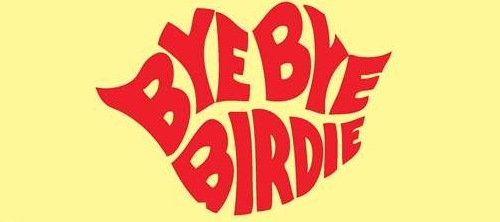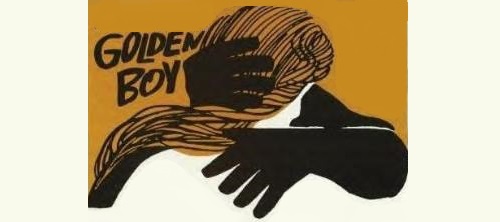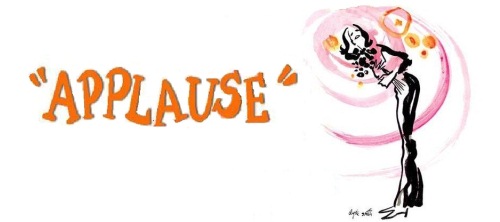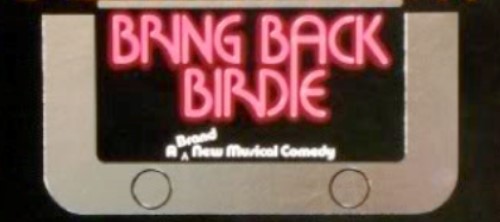Pas de biographie disponible.
Compositeur Musique additionelle Librettiste Parolier Metteur en scène Chorégraphe Producteur création Producteur version

Musical
Musique: Charles Strouse • Paroles: Lee Adams • Livret: Michael Stewart • Production originale: 13 versions mentionnées
Dispo: Résumé Synopsis Génèse Liste chansons
Originally titled Let's Go Steady, the satire on American society is set in 1958. The story was inspired by the phenomenon of popular singer Elvis Presley and his draft notice into the Army in 1957. The rock star character's name, "Conrad Birdie," is word play on the name of Conway Twitty. Twitty is best remembered today for his long career as a country music star, but before that, in the late 1950s, he was one of Presley's rock 'n' roll rivals.
Genèse: The producer Edward Padula had the idea for a musical initially titled Let's Go Steady, a "happy teenage musical with a difference." Padula contracted with two writers, and Charles Strouse and Lee Adams wrote seven songs for their libretto. Padula, Strouse and Adams sought Gower Champion as director/choreographer, who until that time had choreographed only a few musicals. (Fred Astaire and Morton DaCosta had already declined.) However, Champion did not like the book and the writers were fired, with Michael Stewart then hired. Stewart wrote an early version titled Love and Kisses, which focused on a couple thinking of divorce, but whose children persuade them to stay together. Champion wanted "something more". "The 'something more' had been right there in the newspaper. On September 22, 1958, rock-and-roll idol Elvis Presley, having been drafted, boarded a ship for eighteen months in Germany.... There was a media circus including Elvis giving a specially selected member of the Women's Army Corps 'one last kiss'". After brainstorming, Stewart and Adams "came up with the idea of a rock-and-roll singer going off to the army and its effect on a group of teenagers in a small town in Ohio." The name of the singer was Elsworth, then changed to "Conway Twitty before we discovered there was already a Conway Twitty who was threatening to sue us, and then, finally, Conrad Birdie."
Résumé: The fictional story takes place in 1958, centering around Conrad Birdie, a hip-thrusting rock and roll superstar akin to Elvis Presley, Conrad's agent and songwriter, Albert Peterson, and Albert's secretary and love, Rose Alvarez (Rose Grant or Rose DeLeon in some versions), who hails from Allentown, Pennsylvania. Albert finds himself in trouble when Conrad is drafted into the army, so he and Rose come up with a last-ditch publicity stunt to premier one last hit Conrad Birdie record before he is sent to the army. They plan to have Conrad sing Peterson's new song "One Last Kiss" on live television, and give one lucky girl from his fan club a real 'one last kiss' on 'The Ed Sullivan Show' before going off to war. The lucky girl is chosen randomly from Conrad's national fan club, and it happens to be Kim MacAfee. Rose, Conrad, and Albert set off to her house in Sweet Apple, Ohio to prepare for the event. However, things don't go quite as planned; Kim's father becomes obsessed with the prospect of being on The Ed Sullivan Show alongside his daughter, Kim's boyfriend becomes disastrously jealous of Conrad, and Conrad himself becomes tired of the show business life and tries to teach the kids how to party - ultimately getting himself in trouble with the law.
Création: 14/4/1960 - Al Hirschfeld Theatre (Broadway) - représ.

Musical
Musique: Charles Strouse • Paroles: Lee Adams • Livret: Clifford Odets • William Gibson • Production originale: 3 versions mentionnées
Dispo: Résumé Génèse Liste chansons
Genèse: Following the Detroit tryout, Odets died and Gibson was hired to rework the script. The ideals of the noble plot were abandoned in a revision in which Joe evolved into an angry man who, embittered by the constant prejudice he faces, uses his fists to fight his frustrations. His brother became a worker for CORE, and the subtle romance between Joe and the white Lorna developed into an explicit affair capped by a kiss that shocked audiences already having difficulty adjusting to a heavily urban jazz score and mentions of Malcolm X. This was a far cry from the comedies Hello, Dolly! and Funny Girl, both popular holdovers from the previous theatrical season. After twenty-five previews, the Broadway production, directed by Arthur Penn and choreographed by Donald McKayle, opened on October 20, 1964 at the Majestic Theatre, where it ran for 568 performances. In addition to Davis, the cast included Billy Daniels as Eddie Satin, Kenneth Tobey as Tom Moody, Jaimie Rogers as Lopez and Paula Wayne as Lorna Moon, with Johnny Brown, Lola Falana, Louis Gossett,Al Kirk, Baayork Lee, and Theresa Merritt in supporting roles. An original cast recording was released by Capitol Records. One song from the score, "This Is the Life", later became a hit in a cover version recorded by Matt Monro. Davis reprised his role for the 1968 West End production at the London Palladium, the first book musical ever to play in the theatre. Necco (New England Confectionary Company) created a short-lived candy bar inspired by Davis and the musical. It was called "Golden Boy".
Résumé: Joe Wellington is determined to break out of Harlem and make it as a boxer. Despite the disapproval of his family, he hooks up with a manager and after a string of losses, things start to go his way... but as he starts to win in the ring, life outside starts to spiral out of control. With Eddie Satin, the best manager there is, showing an interest in Joe, the woman of his dreams slipping out of reach and his toughest opponent yet lined up in the ring, the stage is set for the fight of his life.
Création: 20/10/1964 - Majestic Theatre (Broadway) - représ.

Musical
Musique: Charles Strouse • Paroles: Lee Adams • Livret: Adolph Green • Betty Comden • Production originale: 10 versions mentionnées
Dispo: Résumé Synopsis Commentaire Génèse Isnpiration Liste chansons
This musical is about show business, and the characters are typical of Broadway's glitter without being types. What is it that we're living for?", sing the impoverished "gypsies", the Broadway dancers, in Act 1 - and the answer? - "Applause, Applause". These lyrics state simply the motive of all the characters in the play; and this song is repeated periodically to remind us of the theme of the show.
Genèse: The Broadway production opened on March 30, 1970 at the Palace Theatre, and closed on July 27, 1972, after 896 performances and 4 previews. Directed and choreographed by Ron Field with the orchestrations of Philip J. Lang, the original cast included Lauren Bacall, Len Cariou, Penny Fuller, Bonnie Franklin, Lee Roy Reams, Robert Mandan, Brandon Maggart, Ann Williams, and Nicholas Dante. When Bacall's contract was up in 1971, the producers initially decided to cast film legend Rita Hayworth as Margo. Hayworth was very interested and flew to New York to audition for the role. However, unbeknownst to anyone at the time, Hayworth was suffering from the beginning stages of Alzheimer's disease and could not retain lyrics or dialogue. Ironically, Anne Baxter, who had portrayed Eve in the original film, replaced Bacall as Margo Channing. When Baxter departed the show in 1972, actress Arlene Dahl replaced her for one month before the show closed. The musical was later adapted for television, starring Bacall, with Larry Hagman replacing Len Cariou in the role of Bill Sampson. It aired in the United States on CBS on March 19, 1973. It has not been released commercially, but it is available for viewing at the Paley Center for Media (formerly The Museum of Television & Radio) in New York City and Beverly Hills, California. New York City Center's Encores! presented a new production of Applause February 7 to 10, 2008. It was directed by Kathleen Marshall and starred Christine Ebersole, Michael Park, Erin Davie, Megan Sikora, Mario Cantone, Tom Hewitt, Chip Zien, and Kate Burton.
Résumé: A la fin des années '60, Margo Channing est une star de Broadway. Mais, en secret, elle est parano au sujet de son âge. C'est alors qu'une jeune fille ambitieuse, Eve, débarque dans sa vie. Très vite, cette jeune fille admirative va devenir la plus grande ennemie de Margo et entrer en compétition avec elle. Eve devient l'understudy de Margo et décide de la sapper complètement afin qu'elle puisse jouer le rôle devant les critiques. A la fin, Eve est devenue une star et la carrière de Margo se fane. Cependant, Margo se rend compte qu'elle peut trouver encore le bonheur … auprès de l'homme qu'elle aime, Bill.
Création: 30/3/1970 - Palace Theatre (Broadway) - représ.

Musical
Musique: Charles Strouse • Paroles: Lee Adams • Livret: William Brown • Production originale: 1 version mentionnée
Dispo: Résumé Génèse Liste chansons
Genèse: The creators hoped that the backstage story about the making of a musical would cash in on the success of A Chorus Line as well as the popularity of the black-themed musical, including Brown's own The Wiz, which was still running at the time. But Brown's much-criticized book is a clichéd spoof of show business lawyers, idealistic young playwrights, glitzy Las Vegas performers, blue-haired matinée ladies, and the black-themed musical itself. The Wiz proved to be Brown's only success. Following a dismal October–November tryout with Helen Gallagher and Julius LaRosa at the theatre in the Riverside Church in Morningside Heights, the producers fired most of the cast and creative personnel, including director/choreographer George Faison. Gower Champion was called in to rescue the Broadway-bound production with only a month to go, but he feared that the show's defects were too serious to remedy and insisted on receiving a "Production supervised by" credit only. After 14 previews, the Broadway production opened and closed at the Lunt-Fontanne Theatre on December 21, 1978. It lost $1 million.[3] The cast included Patti Karr (replacing Gallagher), Alan Weeks, Larry Marshall, Warren Berlinger (replacing LaRosa), Loretta Devine, Jackée Harry, and Tiger Haynes. Julius Novick of The Village Voice called it "the best Broadway musical since Platinum," a disaster that had opened the month before. Critic and theatre historian Ken Mandelbaum has described the show as "a genuine turkey... hopeless... [a] well-meaning but fatally underpowered evening. The Charles Strouse-Lee Adams score had its moments...." A cast album was recorded before an audience during a live performance in December 1978.
Résumé: Backstage story about a white producer's misguided effort to create a musical based on a play written by a black author.
Création: 21/12/1978 - Lunt-Fontanne Theatre (Broadway) - 1 représ.

.png)
.png)





